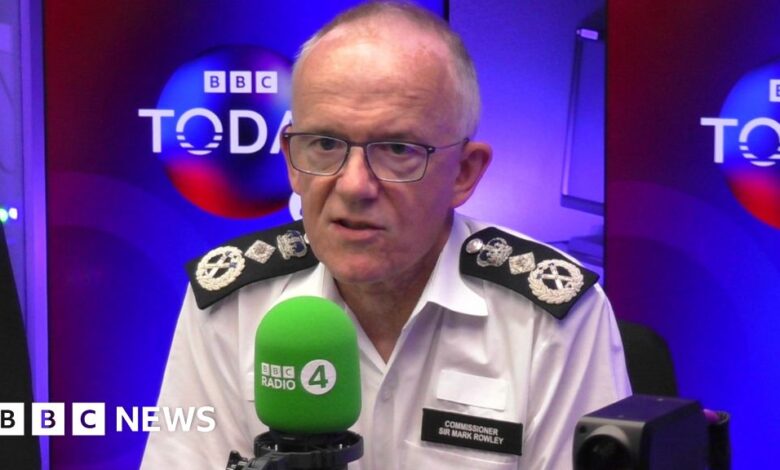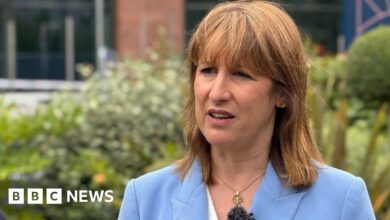Sir Mark Rowley: Met chief warns anti-crime pledges need funding

Police will need more funding in next month’s spending review to meet the government’s pledges to cut crime, the head of the Metropolitan Police has told the BBC.
Sir Mark Rowley praised the government’s “sensible ambition” to halve knife crime and violence against women and girls, as well as boost neighbourhood policing, but said “ambition and money go alongside each other”.
The Met commissioner told BBC Radio 4’s Today programme that police forces across the country were carrying the “scar tissue of years of austerity cuts”.
The Home Office said it was “backing the police to protect our communities and keep our streets safe”.
More “bobbies on the beat” has been a central promise of Sir Keir Starmer’s government.
Last month, the prime minister said thousands of neighbourhood police officers and nearly 400 police community support officers would be recruited over the next 12 months, as part of the target to hit 13,000 by 2029.
Sir Mark told the BBC: “We want to do all the things the government committed to a year ago… We cannot do that without more money as well.”
He said police forces are “much smaller when you compare the population they’re policing than they were a decade or 15 years ago”, before austerity under the previous government.
“Our model is out of date,” he said. “We’re not just asking for more money, we want radical reform in policing as well.”
His suggestions for reform include having fewer policing organisations across the country that can be “more efficient, more capable”, and a “proper national police agency that helps co-ordinate things”.
Police also face growing pressure from new “big challenges”, including global and online threats, as well as social volatility – such as last summer’s riots, Sir Mark said.
It comes as Sir Mark and five other senior police chiefs wrote in a letter to the Times that years of cuts had left forces overstretched and working in “broken” buildings with “outdated” technology.
They warned that a lack of investment would “bake in the structural inefficiencies” of police forces for another three years and risk future reforms.
Chancellor Rachel Reeves is due to deliver her spending review on 11 June, outlining how the government will fund public services in the next few years.
She will set out day-to-day spending for four years to 2028‑29, as well as capital spending for five years to 2029‑30.
The amount of funding policing gets is set at spending reviews, and the majority comes from the Home Office. But how it is allocated is agreed every year by the House of Commons.
The government’s plan for neighbourhood policing involves patrols in “hotspot” areas during the busiest periods, such as Friday and Saturday nights, while anti-social behaviour leads in every force will be expected to develop tailored action plans.
Earlier this year, the government was able to reverse plans by two forces to cut the number of officers by providing extra funding, after they warned that existing levels meant they were having to scale back.
Labour also promised to halve violence against women and girls, put domestic abuse specialists in police control rooms, set up dedicated courts for rape trials, and halve knife and serious violent crime.
Shadow home secretary Chris Philp said the Conservative Party had warned in December that this year’s financial settlement was “not enough to maintain police numbers and fight crime”.
“Now the country’s most senior police officer confirms that,” he said.
Liberal Democrats justice spokesman Josh Babarinde criticised the previous Tory government for “years of mismanagement and neglect” of policing, but said Labour has “failed to step up and tackle the scale of the problem in response”.
A Home Office spokesperson said: “We are backing the police to protect our communities and keep our streets safe with up to £17.6bn this year, an increase of up to £1.2bn.
“This includes £200m to kickstart putting 13,000 additional neighbourhood police officers, PCSOs and special constables that the public will see back on their streets and patrolling communities, as part of our Plan for Change.”
Additional reporting by Emma Rossiter and Francesca Gillett.

Get our flagship newsletter with all the headlines you need to start the day. Sign up here.




